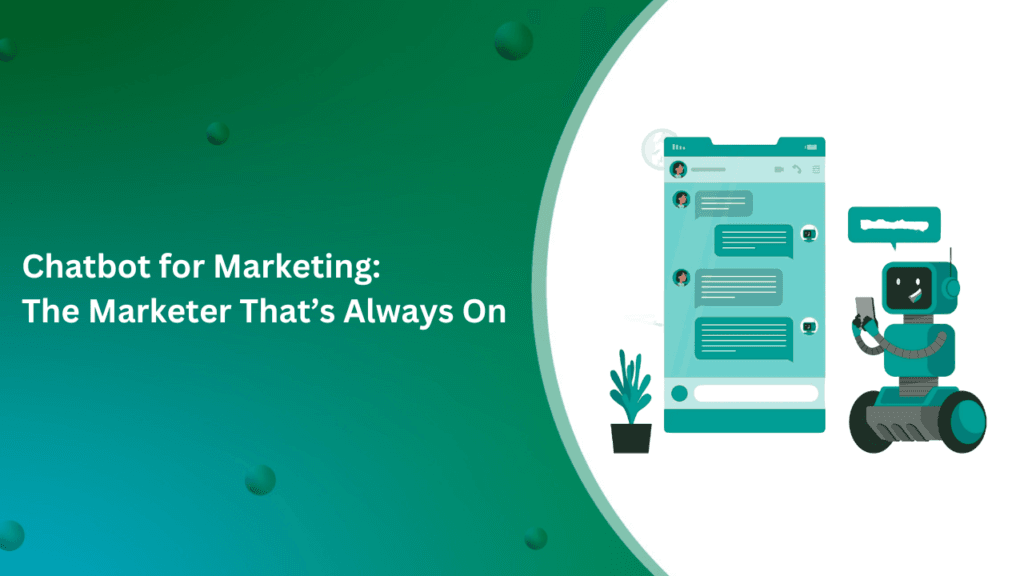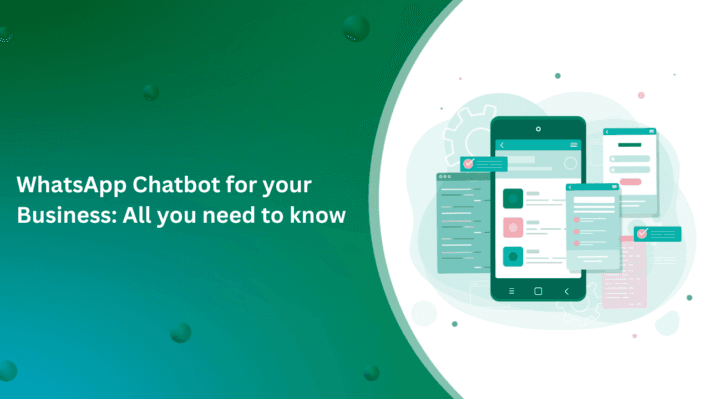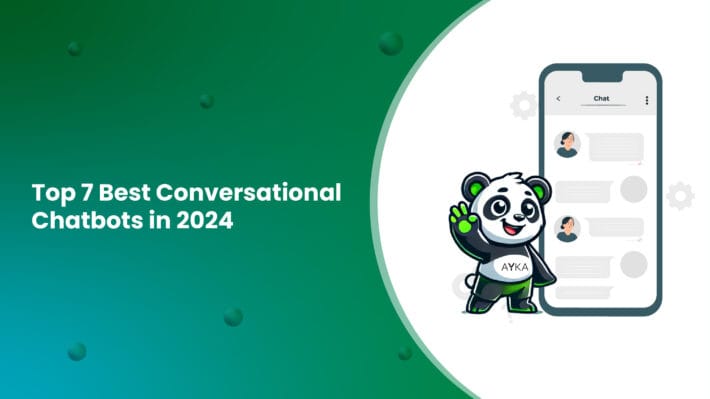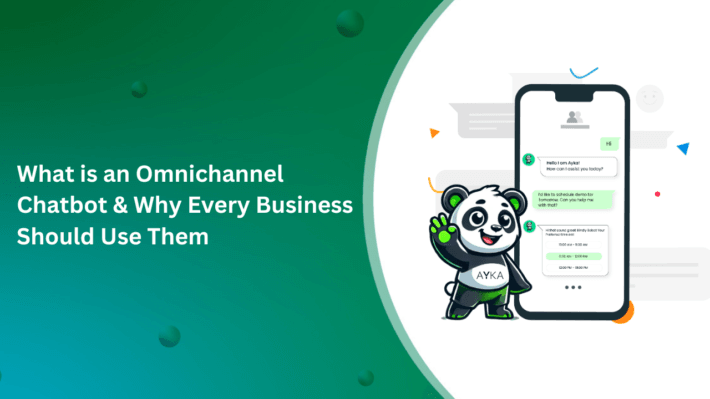Best chatbot for Marketing: Benefits, Examples & Guide

Imagine you’re a small business owner trying to handle everything—responding to customer questions, managing your social media accounts, running marketing campaigns, and making sure your business is growing. One day, you get a message on your website asking about a product you sell. You quickly type a response, but when you finish, you realize you’ve missed several other messages that came in at the same time. You feel frustrated and start asking yourself, “How can I reply faster, keep customers engaged, and make sure I don’t miss any important leads?”
This is where chatbots can make a big difference. Chatbots are tools that automatically reply to customer messages, making communication much faster and easier for you. They can instantly answer common questions, provide customer support, and even help you capture new leads without you needing to do anything extra. Over the past few years, chatbots have become a must-have tool for businesses of all sizes. They help businesses save time, improve customer experience, and stay competitive in today’s fast-paced world.
In this blog, we’ll explain how chatbots can completely change the way you market your business. We’ll focus on SalesTown’s chatbot, a tool designed to help you grow your business by offering a smooth and personalized experience for your customers. With this tool, you can automate your customer support, respond to inquiries faster, and keep customers happy—all while saving valuable time.
What Is a Chatbot for Marketing?
A chatbot for marketing is a tool used by businesses to automatically communicate with people who visit their website or interact with their social media. The main goal of a marketing chatbot is to help generate leads, provide useful information, and guide visitors through the sales process—without needing a person to be involved every step of the way.
Think of it as an automated assistant that works non-stop, 24/7. It can chat with visitors to your website, answer questions, and even help move them closer to making a purchase. For example, if someone asks about a product, the chatbot can instantly give them the information they need or suggest other products they might like. It can also remind customers about promotions, give updates, or send a special offer to encourage them to buy.
Unlike AI-powered chatbots that can learn from conversations and adapt over time, SalesTown’s rule-based chatbots work based on pre-programmed workflows and scripts. This means the chatbot’s responses are predictable and consistent, always providing the right information based on what the user asks. You know exactly what the chatbot will say because it follows set rules for handling customer inquiries.
In simple terms, a chatbot for marketing works like a digital marketing assistant that helps you communicate with customers efficiently. It interacts with website visitors, answers their questions, and gently encourages them to take actions—like signing up for a newsletter or making a purchase—without needing any manual effort from you.
Why Chatbots Are Essential for Modern Marketing
Chatbots have become a key tool in modern marketing because they make it easier for businesses to connect with customers, respond faster, and drive more sales. They help businesses engage with customers, streamline communication, and increase conversions—all of which are important for growth. Here’s why chatbots are now a must-have for businesses:
1. Real-Time Customer Interaction
Chatbots can respond to customers instantly, meaning they can provide support 24/7. This is very important because customers no longer want to wait for long periods to get answers to their questions. With a chatbot, you can reply immediately to customer inquiries at any time of day, even when your business is closed. This kind of instant communication makes customers feel valued and heard, which helps build trust and satisfaction. No one will feel neglected because the chatbot is always available to help.
2. Lead Generation and Qualification
Chatbots don’t just answer questions—they can also help businesses find new customers (generate leads). As the chatbot interacts with visitors, it can ask simple questions to gather important information, such as the customer’s needs or interests. This information can be used to decide whether the person is a potential buyer (a qualified lead) or not. The chatbot can automatically sort the leads, which makes it easier for businesses to focus their efforts on the most promising leads. It’s like having an assistant who helps gather useful details to target marketing campaigns more effectively.
3. Cost Efficiency
One of the best things about chatbots is that they help businesses save money. Instead of having human staff answer simple questions or handle basic customer service tasks, the chatbot can do it. This means businesses can reduce costs because they don’t need to hire as many people to do routine work. The chatbot for Marketing can handle repetitive tasks like answering FAQs, leaving human employees free to handle more complicated problems. It’s like having an employee that works nonstop without getting tired, saving time and money for the business.
4. Improved Conversion Rates
Chatbots can make a big difference in improving conversion rates—the percentage of people who make a purchase after visiting your website. When customers are browsing, the chatbot can help guide them through the process. For example, if someone is thinking about buying a product but is unsure, the chatbot can suggest similar products, answer questions about prices, or even offer a discount to encourage them to buy. It can help customers at key moments, like during checkout, to reduce cart abandonment (when customers leave without buying) and increase sales.
5. Multichannel Marketing Integration
Today, chatbots can work across different communication platforms. This means they can be used not just on a website, but also on Facebook Messenger, WhatsApp, and other messaging apps. This is important because customers don’t always use the same platforms to interact with businesses. Some may prefer texting through Facebook, while others might prefer chatting on your website. By having a chatbot that works on multiple channels, businesses can connect with customers wherever they are. This makes it easier to reach more people and provide them with a consistent experience, no matter how they contact your business.
Benefits of Using Salestown’s Chatbots for Marketing
1. Improved Customer Experience
SalesTown’s chatbots provide prompt and consistent support, enhancing user satisfaction.
- Instant Replies: Users don’t have to wait for a human representative to answer their questions.
- Predictable Interactions: They deliver accurate, error-free responses based on predefined workflows, ensuring a professional tone.
- Personalization: Despite being rule-based, these chatbots can tailor interactions using basic user inputs, such as addressing visitors by name or recommending specific products.
A smoother, faster user experience keeps visitors engaged and boosts brand trust.
2. Consistent and Reliable Communication
Since rule-based chatbots operate on scripts, they ensure every interaction is consistent, predictable, and in line with your brand’s tone and messaging.
- Error-Free Responses: Unlike AI chatbots that might misinterpret inputs, rule-based bots only provide pre-approved answers, reducing confusion.
- Customizable Flow: Businesses can control the exact user journey, ensuring the chatbot aligns perfectly with their goals.
This consistency builds trust and ensures a professional user experience.
3. 24/7 Availability
Salestown’s chatbots work tirelessly around the clock to engage visitors, regardless of the time zone or business hours.
- Always-On Marketing: Capture leads even during off-hours, ensuring your funnel remains active.
- Global Reach: For international businesses, chatbots serve as a key touchpoint for users in different time zones.
By being available 24/7, Salestown’s chatbots ensure no opportunity is missed.
4. Cost-Effective Marketing Automation
rule-based chatbots are a budget-friendly solution compared to hiring additional staff or investing in AI-driven alternatives.
- Low Maintenance Costs: These chatbots require minimal updates since they operate on fixed logic.
- Efficient Scalability: They can handle multiple conversations simultaneously, reducing the need for a large customer service or marketing team.
For businesses seeking affordable ways to scale, rule-based chatbots are an excellent choice.
5. No AI Overhead or Complexity
Unlike AI chatbots, rule-based systems don’t rely on advanced technology or massive datasets, making them more accessible.
- Predictable Outputs: They work within a defined framework, avoiding unpredictable or off-brand responses.
- Ease of Troubleshooting: Any issues can be resolved by simply updating the rules or scripts.
This straightforward functionality is ideal for businesses that prioritize clarity and control.
Chatbot Marketing Examples in the Wild
Many brands have successfully implemented chatbots for marketing. Here are a few examples:
- Sephora: The cosmetics giant uses chatbots to help customers find products based on their preferences and skin types. The chatbot offers personalized recommendations and even books in-store consultations.
- H&M: This fashion retailer uses a chatbot to assist customers in selecting outfits based on their preferences. It also helps users check store availability and book a fitting room appointment.
- Domino’s: Domino’s chatbot, “Dom,” allows customers to order pizzas through a conversational interface. It’s simple, quick, and convenient, making it easy for customers to reorder their favorite pizza.
These examples show how chatbots can engage customers, streamline transactions, and deliver a personalized experience, regardless of the industry.
How We Use Chatbots for Marketing at Salestown
At Salestown, we leverage rule-based chatbots to enhance marketing campaigns, streamline customer engagement, and drive conversions. Our approach focuses on creating tailored experiences that are efficient, responsive, and aligned with specific business goals. Here’s a detailed look at how Salestown utilizes chatbots for marketing success:
1. Lead Engagement and Qualification
Our chatbot initiates meaningful conversations with website visitors to identify potential leads.
- Personalized Interactions: Using predefined rules, the chatbot welcomes visitors with messages relevant to their actions, such as:
- “Looking for [specific service]? Let me guide you!”
- “Need pricing details? Click here, and I’ll help.”
- Qualifying Leads: The chatbot collects critical details like contact information, budget range, and product interest, segmenting leads for better follow-up by our sales team.
This ensures that high-quality leads are identified early in the customer journey.
2. Product Education and Awareness
Our chatbots serve as educators, helping potential customers understand the benefits of our solutions.
- Interactive Guides: Users can explore FAQs, pricing plans, or product features through clickable menu options within the chatbot.
- Content Sharing: Visitors can download ebooks, brochures, or product tutorials directly from the chatbot.
This functionality helps prospects gain the information they need to make informed decisions.
3. Real-Time Support for Visitors
Our chatbot provides instant assistance to users, ensuring a smooth and hassle-free experience.
- Answering FAQs: The chatbot handles common questions like “What are your operating hours?” or “How do I schedule a demo?”
- Reducing Drop-Offs: By proactively addressing user concerns, the chatbot reduces abandonment rates on key pages, such as pricing or checkout.
This immediate support fosters trust and keeps users engaged.
How to Set Up Marketing Chatbots with Salestown
Setting up a chatbot with Salestown is simple and straightforward. Here’s how you can get started:
- Decide When and Where Your Bot Should Appear
Before you start crafting messages, consider these questions to ensure your chatbot delivers maximum value:
- What kinds of leads do we want to reach?
Focus on targeting the right audience, such as website visitors, product page browsers, or social media followers.
- When are your leads most receptive to marketing messages?
Timing is critical. Launch your chatbot during key moments, such as when a user is about to leave a page or after they’ve spent a certain amount of time on a product page.
- Which pages or activities signal high interest?
For instance, if a visitor spends time on a pricing page or watches a product demo, it’s a clear sign of interest, making it an ideal time for the chatbot to step in.
- Craft Persuasive Bot Messages
The next step is crafting messages that resonate with your leads.
Here’s how:
- What format resonates best with leads?
Some leads prefer quick answers, while others might appreciate detailed information. Tailor your chatbot’s responses accordingly.
- What do you want to promote?
Focus on your key offerings. If you’re running a promotion, a new product launch, or a time-sensitive discount, the chatbot should bring it to the user’s attention.
- What do you want leads to do next?
Whether it’s booking a demo, making a purchase, or signing up for a newsletter, ensure the next step is clear and easy to follow.
Best Practices for a Non-Spammy Chatbot Experience
To ensure your chatbot isn’t perceived as intrusive or spammy, follow these best practices:
Don’t Pretend Your Bots Are Human
Be transparent about the fact that your chatbot is automated. Users appreciate honesty and will engage more if they know they’re talking to a bot, not a human.
Trigger Chatbots at the Right Times
Avoid bombarding users with messages as soon as they land on your page. Instead, use triggers like time spent on a page or a specific action (such as scrolling or clicking on a product) to activate the bot.
Test and Refine
Continuous improvement is key to success. Regularly test different bot messages, triggers, and content to refine its effectiveness. Gather feedback from users and tweak your chatbot to improve conversions.
Expand Your Marketing with Chatbots
Once your chatbot is set up, look for opportunities to expand its role in your marketing efforts. Use it to send automated email follow-ups, help with retargeting ads, or even manage social media interactions.
Conclusion
Chatbots have quickly become an essential tool for marketers who want to improve efficiency, engage customers, and increase conversion rates. Salestown’s chatbot is more than just a tool for automation—it’s a smart marketer that works tirelessly to qualify leads, nurture relationships, and drive revenue.
If you’re looking for a chatbot solution that will enhance your marketing efforts and provide a seamless, personalized experience for your customers, Salestown’s chatbot should be at the top of your list. With easy setup, powerful features, and the ability to scale with your business, it’s the marketer that’s always on, helping your business succeed 24/7.
Frequently Asked Questions (FAQ)
Q1. What is a chatbot for marketing?
A chatbot for marketing is an AI-powered tool that automates communication with customers and potential leads. It can engage users, answer queries, qualify leads, recommend products, and provide support—all while enhancing customer experience and driving conversions.
Q2. How can a chatbot improve my marketing strategy?
A chatbot can streamline your marketing efforts by providing real-time customer support, delivering personalized experiences, automating lead generation, and reducing response time. It can handle routine tasks, allowing your marketing team to focus on more complex strategies.
Q3. Can chatbots help with lead generation?
Yes, chatbots can significantly enhance lead generation by engaging website visitors, collecting contact information, and qualifying leads based on predefined criteria. This allows you to nurture high-quality prospects and pass them to your sales team for further action.
Q4. Can a chatbot work on multiple platforms?
Yes, chatbots can be integrated across multiple platforms, including websites, social media (Facebook Messenger, WhatsApp), mobile apps, and email. This multi-channel support ensures consistent customer engagement wherever your audience interacts with your brand.
Q5. Are chatbots suitable for all types of businesses?
Yes, chatbots are versatile tools that can benefit businesses across various industries, including e-commerce, real estate, healthcare, finance, and more. Whether you’re a small startup or a large corporation, chatbots can be customized to suit your marketing needs.



